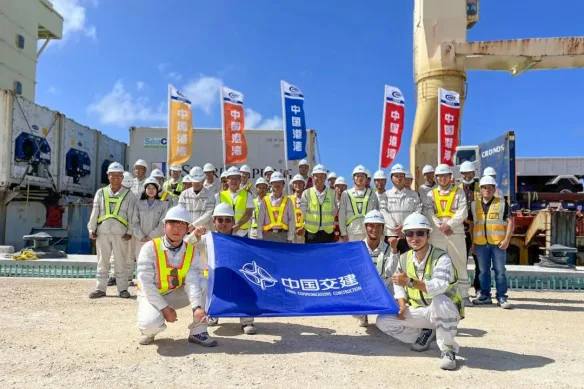Australia will pour almost $500 million (US$328 million) into development projects in the Asia-Pacific region after securing commitments aimed at preventing the participation of Chinese government companies who secure major Pacific Island infrastructure projects by underbidding only to deliver shoddy work.
Minister for International Development and the Pacific Pat Conroy and Foreign Minister Penny Wong inked the new $492 million (US$323 million), four-year funding contribution to the Asian Development Bank on Thursday night.
Conroy stressed the funding deal was delivered after the bank had committed to reforming the way it delivered projects, amid concerns from experts and security officials that Chinese state-owned enterprises were also using Asian Development Bank-funded contracts to advance Beijing’s geopolitical agenda.
Conroy also revealed that Australia’s lobbying of the World Bank to overhaul its procurement processes had produced important reforms while warning that multilateral banks “had unwittingly been caught in a contest” for influence in the South Pacific.
“I am happy to say they are responding to that, and it is their role to be a trusted regional institution rather than unwittingly servicing the needs of any country,” he said, without expressly naming or criticising China.
The revelations come after this masthead revealed how Australia was part-funding, through the Asian Development Bank, a port development in Nauru that had been awarded to a cut-price contractor owned by a controversial Chinese government firm. The firm had been sanctioned by the United States for its links to China’s military and has been embroiled in multiple corruption scandals.
The contractor, the China Harbour Engineering Company, also wired $500,000 (US$328,407) in suspicious payments to the relative of a senior Nauruan official in what Australian security agencies deemed highly suspicious transactions.
Conroy said the Nauru port development highlighted problems with the way multilateral development banks were managing projects, but declined to comment further.
The Nauru project is being closely watched by senior Australian officials, with one telling this masthead on the condition of anonymity: “It is definitely an example where choosing the cheapest tenderer has led to massive problems with the project. And you just have to visit Nauru to understand the challenges that government has had in fixing that.”
Despite major cost and time blowouts and the use of Chinese rather than local labour, the Nauru port project was heralded by the Chinese Communist Party as a case study of the success of its global Belt and Road infrastructure initiative and of the benefits Pacific Island nations could enjoy if, like Nauru, they deepened ties with Beijing.
The $492 million (US$323 million funding contribution by Australia to the Asian Development Bank will begin next year and represents a $69 million (US$45 million) increase in the previous four-year package delivered to the multilateral development bank by the former Coalition government.
It is just one of several major funding announcements planned by the Albanese government to boost Australia’s influence in the region. Labor is expected to soon unveil a funding package aimed at increasing the support Canberra provides to Pacific Island police forces.
The multilateral development banking reforms Conroy described in an exclusive interview with this masthead will stem the flow of projects being awarded to Chinese government-owned contractors.
Conroy said the Asian Development Bank — whose two greatest funders are Australia and Japan — and the World Bank had both committed to ensuring multilateral development bank-funded projects focused more on delivering quality outcomes in the Pacific rather than handing projects to the lowest bidders.
Asked why so many Chinese state-owned enterprises had won development projects in the region, the minister said: “Often they are the cheapest, and until the MDBs [multilateral development banks] develop sophisticated procurement systems, they will pick the cheapest options. And if you are the cheapest option, often you are the lowest quality, and you bring in your own workforce.”
While nations such as Nauru and Solomon Islands have publicly embraced Chinese government development support and contractors, other Pacific island nations have followed Australia’s lead in raising concerns about the quality and intent of Beijing’s expanding regional aid agenda.
In an exclusive interview with this masthead, Fiji’s Prime Minister Sitiveni Rabuka said some Beijing-backed projects in Fiji “are really not up to standard”.
“We will be repairing them before we open,” he said, warning that quality control had failed.
Conroy said the federal government’s recent decision to contribute an extra $20 million(US$13 million) to a port redevelopment project in Tonga had led to the appointment of a New Zealand contractor and the delivery of “a better project using Tongan workers”.
He described being “quite annoyed” at seeing projects in the Pacific that were funded by Australia and Japan via the Asian Development Bank, but which were branded as initiatives of other countries whose contractors had won the bank’s tenders.
“The problem is the local population then associate the project with that other country. The ADB has responded to our concerns, and has issued new guidance around how projects are branded,” Conroy said.
The Nauru port project features prominent signage promoting the China Harbour Engineering Company, which claims to have won infrastructure projects after “cultivating the South Pacific Island market for many years”.
The company has won key airport and harbour upgrades in Papua New Guinea, a university expansion project in Solomon Islands, and faced a storm of publicity in 2018 in connection with the redevelopment of a Sri Lankan port.
In a recent statement, the Asian Development Bank said Nauru had selected China Harbour following a tender process that the bank reviewed and endorsed.














